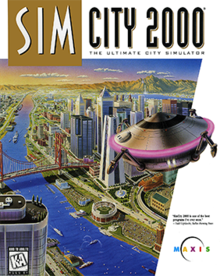| SimCity 2000 | |
|---|---|
 | |
| Developer(s) |
|
| Publisher(s) | Maxis
|
| Designer(s) | Will Wright[6] Fred Haslam |
| Artist(s) | Jenny Martin[6] Suzie Greene Kelli Pearson Eben Sorkin |
| Composer(s) | Sue Kasper[6] Brian Conrad Justin McCormick |
| Series | SimCity |
| Platform(s) | Mac OS, MS-DOS, Amiga, SNES, Sega Saturn, PlayStation, Nintendo 64, Game Boy Advance, Windows 95, Windows Mobile |
| Release | |
| Genre(s) | City-building |
| Mode(s) | Single-player |
SimCity 2000 is a city-building simulation video game jointly developed by Will Wright and Fred Haslam of Maxis. It is the successor to SimCity Classic and was released for Apple Macintosh and MS-DOS personal computers in 1993,[7] after which it was released on many other platforms over the following years, such as the Sega Saturn and SNES game consoles in 1995 and the PlayStation in 1996.[8]
SimCity 2000 is played from an isometric perspective as opposed to the previous title, which was played from a top-down perspective. The objective of the game is to create a city, develop residential and industrial areas, build infrastructure such as power and water facilities and collect taxes for further development of the city. Importance is put on increasing the standard of living of the population, maintaining a balance between the different sectors, and monitoring the region's environmental situation to prevent the settlement from declining and going bankrupt, as extreme deficit spending gets a game over.[9]
SimCity 2000 was critically praised for its vibrant and detailed graphics, improved control menu, gameplay and music. An approximate total of 4.23 million copies of SimCity 2000 have been sold, mainly in the United States, Europe and Japan. While its predecessor pioneered the city-building genre of video games, SimCity 2000 would become the model upon which subsequent urban simulators would be based over the course of the next decades.
- ^ "Electronic Nirvana". Chicago Tribune. 1993-12-16. Retrieved 2024-02-19.
- ^ "SimCity 2000 Review". CU Amiga. December 1994. p. 48.
- ^ "Press release: 1995-10-11: MAXIS ANNOUNCES SIMCITY 2000 FOR THE SEGA SATURN; ULTIMATE CITY SIMULATOR NOW AVAILABLE TO CONSOLE GAMERS". Sega Retro. 2017-06-02. Retrieved 2023-05-06.
- ^ "Sony PlayStation Available Software sorted by Release Date @ www.vidgames.com". 1998-06-11. Archived from the original on 1998-06-11. Retrieved 2023-10-04.
- ^ "ign64.ign.com: SimCity Launched in Japan". 2000-09-01. Archived from the original on 2000-09-01. Retrieved 2023-10-04.
- ^ a b c "SimCity 2000 Dos Credits". 2006-04-04. Archived from the original on 2006-05-08. Retrieved 2019-01-15.
- ^ "SimCity History". simcity.com. Electronic Arts. 19 October 2016. Archived from the original on 21 February 2017. Retrieved 16 April 2017.
- ^ "OS/2 e-Zine! - SimCity 2000 for OS/2". Archived from the original on 2011-09-27. Retrieved 2010-12-03.
- ^ Dargahi, Nick; Bremer, Michael (1994). SimCity 2000: Power, Politics, and Planning. USA: Prima Publishing. pp. 36 and 161. ISBN 1-55958-192-1.